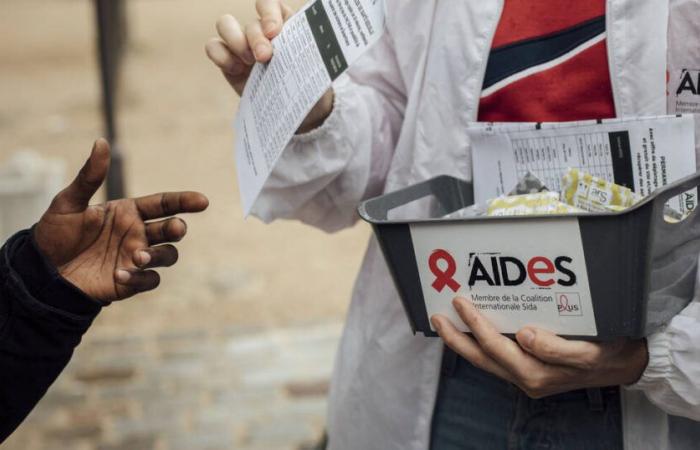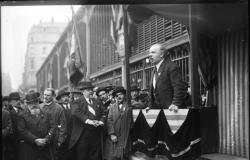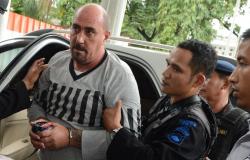Faces in a hurry parade continuously on the square in front of Saint-Denis station. Wrapped up in their parka to protect themselves from the cold and rain of this Monday at the end of November, Nolwenn and his colleagues hold out leaflets which reveal a logo in the shape of a red ribbon. A few curious people are invited to take shelter and chat under the sheds, one of which displays a tarpaulin indicating: “HELP, rapid tests are here.” Like every week, a team from the Seine-Saint-Denis section of the Aides association came with its truck to do prevention and offer rapid and free screening for HIV, syphilis and hepatitis B and C.
“So, how’s the coffee?”says Yanncey Maisonneuve with a broad smile, who joins his comrades from the van converted into a mobile screening unit. Yanncey is experienced, he has worked for Aides since 2012 and knows that the action in front of Saint-Denis station attracts “always in the world”. “Seine-Saint-Denis is a department whose population has a high prevalence of HIV”he summarizes. According to a 2022 press release from the department’s primary health insurance fund, it “is in second position among the most affected departments in mainland France, behind Paris” with 300 to 400 new cases of HIV detected per year.
Great precariousness
In its surveillance report on HIV and sexually transmitted infections (STIs) published in October, Public Health France recalls that 57% of the 5,500 contamination discoveries in 2023 concerned people born abroad, particularly in sub-Saharan Africa. (38%). “But we must also remember that 42% of seroconversions occur on French territory according to the same report”specifies Nolwenn, countering possible racist rhetoric. Migrants are often in great precariousness, far from care pathways, little informed about Prep (preventive treatment to avoid being contaminated) and are unfortunately more exposed to infections.
After a few refusals, Nolwenn attracts a curious person and describes the contents of the stand. Among the numerous information flyers are internal and external condoms, lubricant, tampons and feminine intimate hygiene kits, HIV self-tests and even sterilized single-use syringes (“to avoid infections when using drugs”). His interlocutor, like many, leaves with a handful of condoms.
If, at the front of the stand, prevention is in full swing, at the back, Yanncey and Nina are increasing the number of screenings. During a brief break, the activist lights a cigarette. She joined the association in 2018 after being diagnosed with HIV. Since then, she has trained to carry out the tests and “to support people who are disconnected from the care pathway and enable them to become independent.” Her cigarette barely finished, she goes to take care of another screening. Pascal, a 34-year-old Congolese worker, wants to be tested for HIV, hepatitis and syphilis. As always, Nina begins by asking a battery of questions to the person in front of her about their health, their knowledge of HIV, their vaccines, their sexual practices… Then, with a small prick on the tip of the finger, she recovers a few drops of blood and reacts them with an active ingredient.
“It’s political”
While waiting for the results, the health coach continues her interview and asks Pascal if he benefits from state medical aid (AME). “No.” “You really have to fight to have the SOUL, but it’s your right”the young woman reminds him by giving him her results, which are negative, and inviting him to come see her at the Dyonisian Aides premises during duty hours on Wednesday afternoon to start putting together a file.
“The fight against the HIV epidemic is political” Nina huffs after another cigarette. “Today, 49% of people eligible for AME do not use itrecalls Camille Spire, president of Aides, reached by telephone. But for migrant populations, without AME, they have no access to care or treatment. So the virus continues to spread. Removing or modifying the AME would be indecent for patients and terribly ineffective in terms of public health.”
End of the day for the Saint-Denis team. Before breaking camp, the activists debrief: “It was a big afternoon. With Nina, we did seventeen screenings, concludes Yancey, tired, but still smiling. It is in this area that we have a real impact and reach our target audience..»
By 2030, France wants to have eradicated AIDS. For this, the action alone of associations like Aides will not be enough. On the phone, Camille Spire calls him again: “We must review the policy for welcoming migrants, promoting their access to care.” Against the last wishes of the Barnier government.






